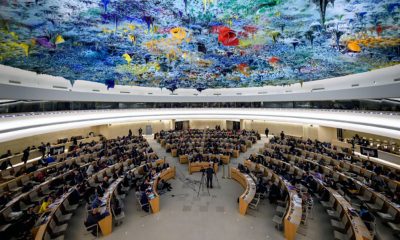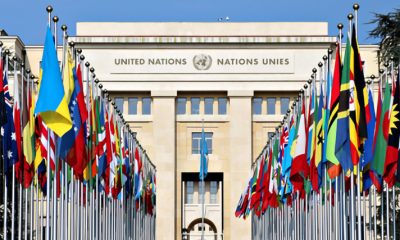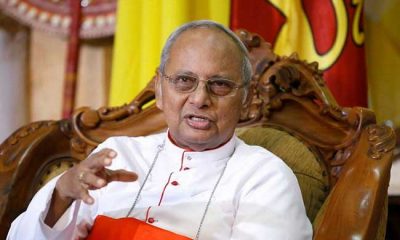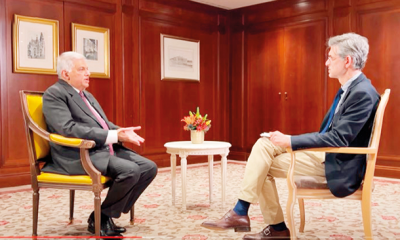News
‘War crimes’: Not only individuals but also entire fighting divisions ‘blacklisted’ – Foreign Minister

By Shamindra Ferdinando
Foreign Minister, Ali Sabry, PC, yesterday (05) said entire fighting divisions which had been deployed on the Vanni front during Eelam War IV (2006-2009) had been ‘blacklisted’ on the basis of findings made by the Geneva-based United Nations Human Rights Council (UNHRC).
Minister Sabry called it a move to tarnish Sri Lanka’s image. He said so when The Island asked him how President Ranil Wickremesinghe’s government intended to counter an attempt by a section of the international community to adopt punitive measures against senior military personnel such as Field Marshal Sarath Fonseka, MP, Chief of Defence Staff General Shavendra Silva, and Maj. Gen. (retd.), Chagie Gallage, on the basis of unsubstantiated allegations.
The issue came up at a media briefing called by the Foreign Ministry to explain the current state of affairs with the focus on staff-level agreement with the International Monetary Fund (IMF) with regard to USD 2.9 bn loan facility and the forthcoming Geneva sessions.
Minister Sabry will lead the delegation for the 51 sessions next week. Justice Minister Wijeyadasa Rajapakse, PC will be among the delegates.
Foreign Secretary Aruni Wijewardane, a retired member of the Sri Lanka Foreign Service, too, responded to some of the issues raised by the media.
Minister Sabry said that in addition to the individuals mentioned, the entire Divisions had been targeted. The President’s Counsel also made reference to obstacles faced by the military in undertaking missions under UN command due to unsubstantiated allegations directed at them.
When The Island questioned the reluctance on the part of the Foreign Ministry to properly defend the war winning armed forces, particularly the inordinate delay in exploiting disclosures made by Lord Naseby in the UK House of Lords, Minister Sabry emphasized that the ministry hadn’t been hesitant. The Minister explained that they had addressed this issue at different levels.
An explanation was also sought as to why UN accusations pertaining to the massacre of as many as 40,000 Tamil civilians on the Vanni east front couldn’t be countered on the basis of exposed classified UK diplomatic dispatches.
Lord Naseby made the shocking disclosure in the House of Lords in Oct 2017.
Asked whether the US denied visa to President Gotabaya Rajapaksa over his role as the wartime Defence Secretary, Minister Sabry said that he was not aware of such a situation.
President Gotabaya Rajapaksa had to seek shelter in Male in mid-July before flying to Thailand after the US refused to issue him a visa. Responding to another query, Minister Sabry said that he didn’t inquire from the former President about the circumstances he was denied the visa.
Responding to other print and electronic media, the former Justice Minister stressed that Sri Lanka was ready to form a Truth Seeking Commission to address the grievances of those who suffered during the conflict. The President’s Counsel said there was a responsibility on the part of the government to ensure that the armed forces, too, get an opportunity to answer accusations directed at them.
Minister Sabry reiterated the stand taken by his predecessor Prof. G. L. Peiris that whatever the solution that couldn’t be outside the Constitution under any circumstances. The minister stressed that President Wickremesinghe’s government was prepared to set up a domestic mechanism (Truth Seeking Commission) in line with the Constitution.
Minister Sabry said that an external mechanism established to gather evidence pertaining to alleged war crimes was not acceptable to Sri Lanka.
At the onset of the briefing, Minister Sabry explained that the staff level agreement with the IMF entirely depended on the success in working out debt restructuring plan with Sri Lanka’s creditors. Referring to President Wickremesinghe policy statement and the interim budget, Minister Sabry explained measures taken by the government to improve the ground situation.
The Foreign Minister strongly defended measures taken by President Wickremesinghe to restore law and order. Acknowledging that those who had been struggling to make ends meet launched street protests, Minister Sabry alleged that certain elements exploited the situation. The failure to take countermeasures would have plunged the country into a vicious circle of violence, Minister Sabry said, alleging a section of the foreign media of giving only one sided story.
Minister Sabry said that if the anarchic situation was allowed to continue we would have ended up like Libya, Iraq or Venezuela. In spite of them having quite extensive natural resources, they still couldn’t recover as their institutions had been destroyed, the minister said.
News
Ravi demands full disclosure on Lanka’s usable reserves, flags forex leakages
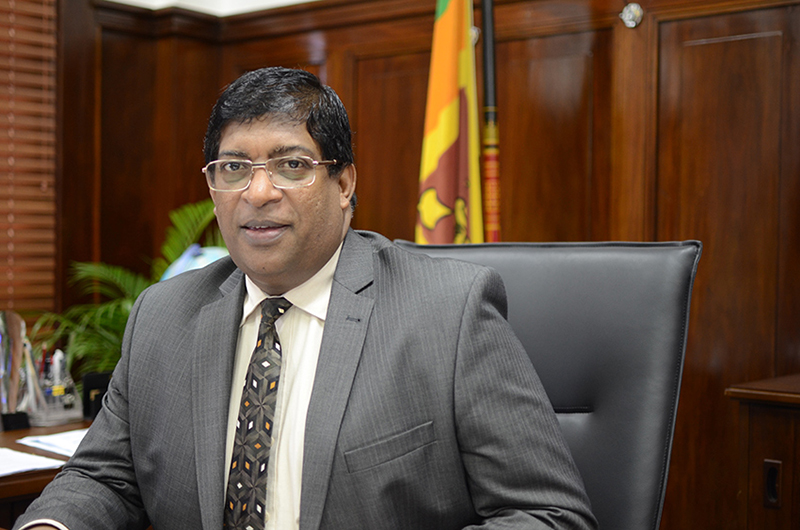
Opposition MP Ravi Karunanayake on Wednesday called for an urgent government statement to Parliament on the integrity and usability of Sri Lanka’s Gross Official Reserves (GOR), raising concerns over foreign exchange leakages and regulatory consistency under the Foreign Exchange Act No. 12 of 2017.
Raising the issue under Standing Order 27 (i), Karunanayake urged the Government to provide a comprehensive disclosure on the composition, encumbrances and deployability of the country’s reserves, as well as on the Central Bank’s oversight of foreign currency transactions.
“Reserve credibility depends not merely on headline numbers, but on transparency, enforceability and consistency in regulation,” the MP told the House.
He sought clarification on the latest reported GOR figure and the net usable reserves after excluding encumbered assets, swaps and pledged balances. He also requested details of annual revenue earned on reserves from 2023 to 2025.
Following are the questions raised by MP Karunanayake:
1. What is the latest reported GOR figure, and what is the net usable reserve after excluding encumbered assets, swaps, and pledged balances? What is the revenue earned on are GOR 23-25 per year?
2. Provide a separate and detailed breakdown of GOR, including: (a) Monetary gold (quantity and valuation basis) is it real gold or gold paper? (b) Foreign currency assets by major currency and instrument; (c) SDR holdings; (d) IMF reserve position; (e) Foreign currency swaps, specifying counterparty type, principal amount, tenure, maturity profile, and all-in cost; (f) Domestic swaps, specifying amount, tenure, rollover terms, collateralisation, and effective cost.
3. Of the total reserves reported, how much is encumbered, swap-backed, or otherwise not immediately deployable for debt servicing or currency stabilisation?
4. What SLR spread, fee, or margin does the Central bank apply when buying or selling USD to the Government for reserve accumulation and external debt servicing and what total profit or gain has the C.bank realised from such transactions during the past three financial years? Advice per year.
5. Is the Central Bank subject to continuous and statutory audit by the Auditor General? If so, will the Government table the most recent audit report, specifying audit scope, sample size, reserve confirmations, swap verification and gold custody validation?
6. What triggered the recent circular warning domestic institutions on foreign currency transactions?
7. Has the C.bank quantified foreign exchange and tax revenue losses resulting from Sri Lanka-based businesses routing credit card and commercial payments through overseas payment gateways?
8. If domestic entities are regulated strictly, why has a binding circular not been issued against noncompliant business entities using foreign payment gateway arrangements that divert foreign exchange outside Sri Lanka’s regulated banking system?
The government asked for two weeks’ time to respond to the queries.
by Saman Indrajith
News
Sajith exposes highly questionable coal imports from South Africa in 25 vessels; calls for independent probe
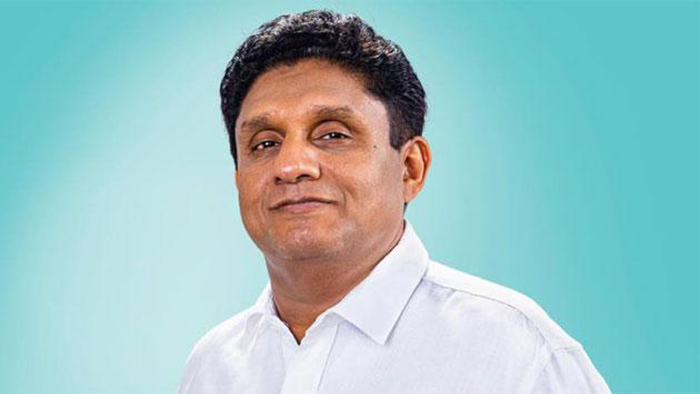
Opposition Leader Sajith Premadasa yesterday alleged in Parliament that eight recently imported coal shipments were substandard and called for an independent probe into the matter.Speaking in the House, Premadasa said Sri Lanka typically requires 36–38 coal shipments annually. While 11 Russian shipments received so far had raised no concerns, he claimed that 25 vessels ordered from South Africa under a new tender were facing quality issues.
He cited combustion reports from the Norochcholai Coal Power Plant showing that the eight shipments already received under the new tender failed to generate the expected 300 megawatts per unit. According to the MP, the outputs were: 285 MW, 290 MW, 260 MW, 295 MW, 285 MW, 270 MW, 275 MW, and 255 MW.
“These are scientific data generated automatically through boiler combustion reports that cannot be altered,” Premadasa said, asserting that the figures indicate the coal supplied was below required standards.
He warned that low-quality coal could increase fuel consumption, raise operational costs, and damage equipment. Any shortfall in power generation, he said, would necessitate additional coal imports or greater reliance on diesel power, ultimately driving up electricity tariffs for consumers.
“The loss will have to be borne by the electricity consumer,” Premadasa said, urging the government to clarify whether the shipments met required specifications.
He also criticized delays and changes in tender requirements, alleging that supplier eligibility criteria had been relaxed to allow non-standard providers.
by Saman Indrajith
News
Ex-TRCSL Chairman Palpita enlarged on bail
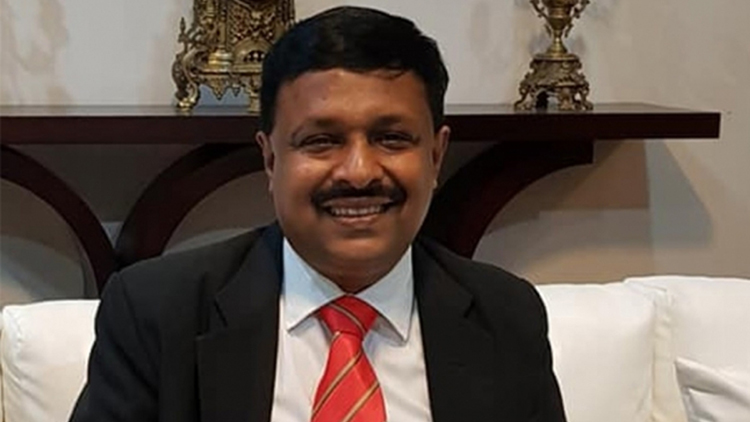
Former Mass Media Ministry Secretary and former Telecommunications Regulatory Commission of Sri Lanka (TRCSL) Chairman Anusha Palpita was yesterday released on bail by the Colombo Chief Magistrate’s Court.Colombo Chief Magistrate Asanga S. Bodaragama granted bail after considering submissions made by officials of the Bribery Commission and counsel for the defence.
The Magistrate ordered the suspect’s release on two personal surety bonds of Rs. 5 million each and imposed a foreign travel ban.
When the case was taken up, Bribery Commission officials informed court that a report had been called regarding alleged investments made by the suspect in the stock market. They sought a further date to present facts pertaining to those reports.
Appearing for the suspect, Attorney-at-Law Kanchana Ratwatte submitted that his client had been in remand custody for nearly a month and was prepared to extend full cooperation to investigators. He moved for bail on that basis.
After hearing both sides, the Magistrate observed that no reasonable grounds had been placed before court to further remand the suspect and ordered his release on bail. The case was fixed for 29 May.
Palpita was arrested on 23 January in connection with an investigation initiated by the Bribery Commission over the alleged failure to disclose the source of assets amounting to Rs. 46 million.
The Commission stated that he had arrived at its office on the day of his arrest to give a statement and was taken into custody thereafter.
He was arrested on allegations of amassing assets and property disproportionate to his declared income during a specified period, following a probe into wealth allegedly accumulated beyond his lawful earnings.
-

 Life style6 days ago
Life style6 days agoMarriot new GM Suranga
-

 Business5 days ago
Business5 days agoMinistry of Brands to launch Sri Lanka’s first off-price retail destination
-

 Features6 days ago
Features6 days agoMonks’ march, in America and Sri Lanka
-

 Features6 days ago
Features6 days agoThe Rise of Takaichi
-

 Features6 days ago
Features6 days agoWetlands of Sri Lanka:
-

 News6 days ago
News6 days agoThailand to recruit 10,000 Lankans under new labour pact
-

 News6 days ago
News6 days agoMassive Sangha confab to address alleged injustices against monks
-

 Sports2 days ago
Sports2 days agoOld and new at the SSC, just like Pakistan


